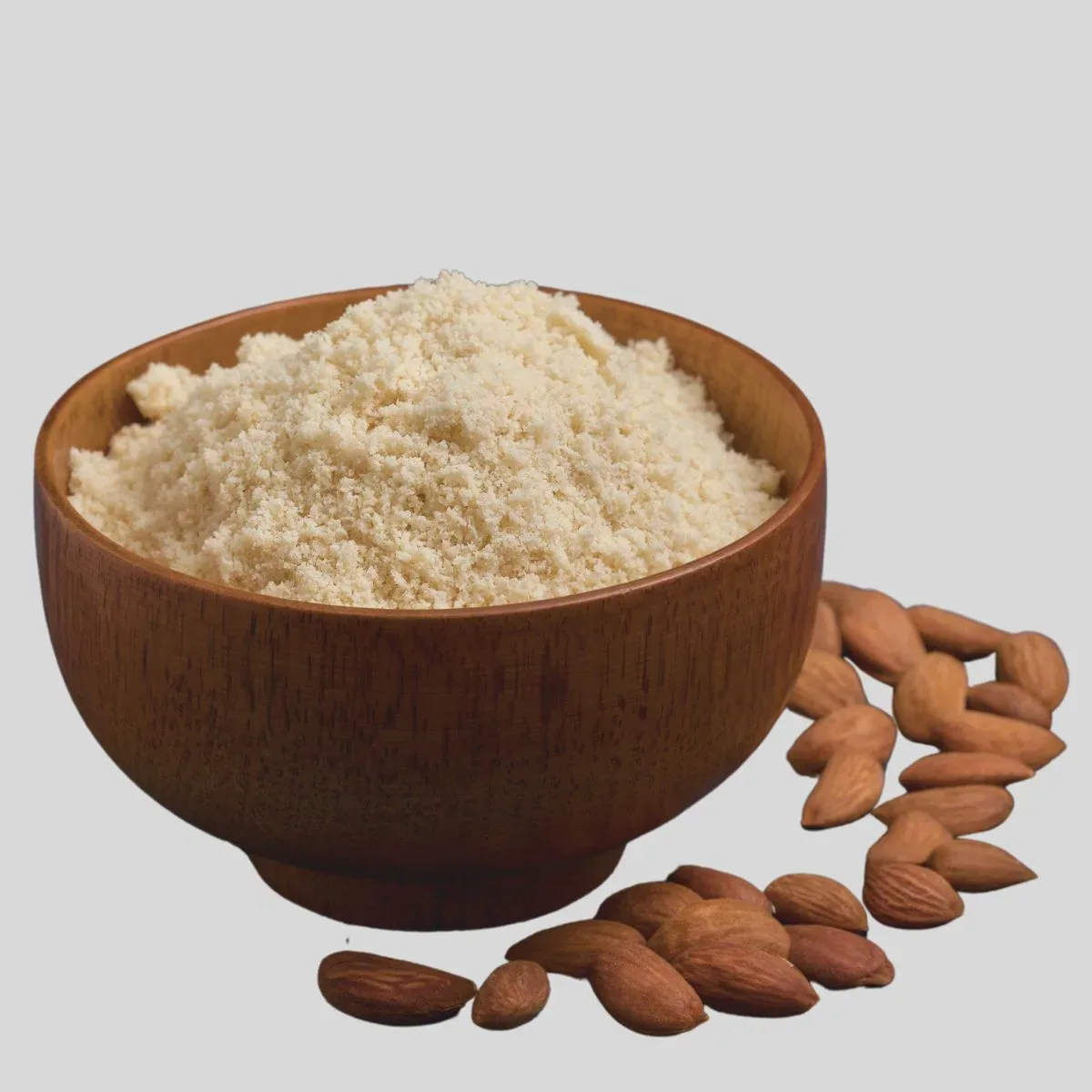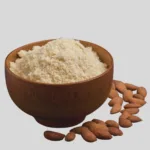Exploring almond meal substitute options can open up a world of culinary possibilities, especially for those engaged in baking and cooking recipes that call for this versatile ingredient.
Almond meal, made from ground almonds, offers a distinct texture and nutty flavor that enriches a variety of dishes. However, when dietary restrictions, allergies, or simply a pantry shortfall arise, knowing how to effectively substitute this ingredient while maintaining the desired texture and taste becomes essential.

Whether you’re working with finely-ground blanched almonds, typically known as almond flour, or the coarser almond meal, understanding the nuances of each and how they impact your baking and cooking can lead to delicious, creative outcomes.
This post aims to guide you through the best almond meal substitutes, ensuring your recipes remain delightful and satisfying, even when adjustments are necessary.
Almond Meal and Almond Flour
Almond meal and almond flour, while both made from ground almonds, differ significantly in their texture, processing, and best uses in recipes, particularly in baking.
Because almond meal is made from whole ground almonds with their skins on, this leads to a coarser texture that adds a more pronounced nutty texture to recipes. This makes it ideal for heartier baked goods, like muffins and rustic breads, where a grainier consistency is desired.
On the other hand, almond flour is made from finely-ground blanched almonds, where the skins are removed before grinding.
This process yields a finer, softer flour that closely mimics the texture of traditional wheat flour, making it a favorite in delicate recipes, such as macarons, fine cakes, and other pastries where a smooth, refined texture is crucial.
The choice between almond meal and almond flour in baking can significantly affect the texture and appearance of the final product, underscoring the importance of selecting the right one based on the specific requirements of your recipes.
Why Almond Meal?
Almond meal has emerged as a highly sought-after ingredient in kitchens around the globe, particularly among those catering to gluten intolerance, celiac disease, or simply looking for a nutritious flour substitute.
Unlike traditional wheat flour, almond meal is gluten-free, making it an excellent choice for individuals with gluten-related disorders or preferences. It’s made from whole ground almonds, which means it not only adds a delicious, nutty flavor to recipes but also increases the protein content, contributing to more satisfying and nourishing meals and baked goods.
However, for those with a nut allergy, almond meal might not be a suitable option, highlighting the importance of understanding and exploring alternative flour substitutes. Its nutritional profile, including healthy fats, fiber, and protein, offers a substantial benefit over many conventional flours, making it a go-to for health-conscious bakers and cooks.
Additionally, the use of almond meal in recipes can often result in a moist, dense texture, ideal for certain types of cakes, cookies, and breads.
Almond Meal Substitute Options
Whether you’re paleo and looking for a grain-free substitute or another option for gluten-free flour, the below list of nut flours will fit the bill.
Cashew Flour
Why It’s a Good Substitute: Cashew flour is made from finely ground cashews and serves as an excellent substitute for almond meal due to its similar fat content and texture.
It’s perfect for those looking to diversify their nut-based flour options while still maintaining a rich, buttery flavor in their baked goods. Cashew flour is also a good source of protein and essential minerals, making it a nutritious option for baking.
Best Used For: Its mild, sweet flavor makes cashew flour ideal for cakes, cookies, and pastries where its unique taste can shine. It’s also great for thickening sauces and as a base for gluten-free crusts, offering a delicate, tender texture that’s similar to that of almond meal.
Pecan Flour
Why It’s a Good Substitute: Pecan flour, with its rich, buttery flavor, is another excellent alternative to almond meal. It’s made from ground pecans and boasts a high fat and protein content, similar to almond meal, which helps to keep baked goods moist and flavorful. Pecan flour adds a depth of flavor that’s unmatched by other nut flours.
Best Used For: This flour is best used in recipes where its robust flavor can complement the overall dish, such as in brownies, pie crusts, and homemade bread. Its unique taste also makes it suitable for creating flavorful, nutty coatings for meats and vegetables.
Hazelnut Flour
Why It’s a Good Substitute: Hazelnut flour, made from ground hazelnuts, is a flavorful substitute for almond meal. It imparts a rich, aromatic flavor to baked goods and is similarly high in protein and healthy fats. Its fine texture makes it an excellent choice for refined pastries and desserts.
Best Used For: Hazelnut flour is particularly well-suited for making decadent desserts like chocolate cakes, brownies, and cookies, where its distinct flavor enhances the overall taste. It’s also ideal for gluten-free and low-carb baking, adding a sophisticated twist to traditional recipes.
Walnut Flour
Why It’s a Good Substitute: Walnut flour is created from ground walnuts and serves as a nutritious substitute for almond meal. It’s rich in omega-3 fatty acids and antioxidants, offering a healthful boost to any dish. Walnut flour has a slightly coarser texture and a bold, earthy flavor that distinguishes it from other nut flours.
Best Used For: This flour is best used in recipes where its hearty flavor will be a complement, such as in bread, muffins, and hearty, rustic cakes. It can also be used to add a nutty taste and extra nutrients to smoothies and oatmeal.
Nut-Free Substitute Options
Cassava Flour
Why It’s a Good Substitute: Cassava flour is a superb alternative to almond meal for several compelling reasons. Made from the whole root of the cassava plant, it is naturally gluten-free, making it an excellent option for those with gluten intolerance or celiac disease.
Unlike other gluten-free flours, cassava flour has a very neutral flavor and a texture similar to that of wheat flour, which makes it a versatile substitute in a variety of recipes. It’s also nut-free, which is perfect for individuals with nut allergies.
Best Used For: Cassava flour is best utilized in recipes that require a light, smooth texture similar to that achieved with traditional wheat flour, such as bread, cakes, cookies, and even in making homemade pasta. Its ability to mimic the properties of wheat flour without the gluten makes it especially useful for those seeking to make gluten-free versions of classic recipes.
However, because it’s highly absorbent, slight adjustments to liquid ratios in recipes may be necessary.
Wheat Flour
Why It’s a Good Substitute: Wheat flour is the most traditional substitute for almond meal, especially in terms of baking and cooking versatility. It’s rich in gluten, which provides elasticity and strength to doughs and batters, allowing for a variety of textures from airy and light to chewy and dense.
For those without gluten intolerance or celiac disease, wheat flour offers an easy-to-use, cost-effective alternative with a neutral taste that fits into nearly any recipe.
Best Used For: Wheat flour shines in almost every application where almond meal is used, from baking bread, cakes, and cookies to thickening sauces and coating foods before frying. It’s particularly well-suited for recipes that rely on gluten for structure and texture, such as yeasted breads, where almond meal cannot provide the same results.
While not suitable for those with gluten-related health concerns, wheat flour remains a staple in traditional baking and cooking for its unmatched versatility and availability.
Coconut Flour
Why It’s a Good Substitute: Coconut flour is a fantastic substitute for almond meal, especially for those with nut allergies or looking to reduce calorie intake.
Derived from dried and ground coconut meat, it’s naturally gluten-free and high in fiber, protein, and healthy fats, making it suitable for individuals with gluten intolerance or celiac disease. Its absorbent nature means you’ll need less coconut flour than almond meal in recipes, which can help lower the overall calorie content of your dishes.
Best Used For: Coconut flour is best used in baked goods like muffins, cakes, and cookies where its slightly sweet, coconutty flavor can complement the overall taste profile.
However, due to its high absorbency, adjustments in liquid ingredients are often necessary to achieve the right texture. It’s ideal for those seeking lower-carb options or catering to a paleo diet.
Oat Flour
Why It’s a Good Substitute: Oat flour, made from ground oats, serves as an excellent substitute for almond meal for several reasons. It’s gluten-free (when made from certified gluten-free oats), making it a safe option for those with celiac disease or gluten intolerance.
Rich in fiber and protein, oat flour offers a similar nutritional profile to almond meal but without the concern for nut allergies. Its mild flavor and smooth texture make it a versatile ingredient in a wide range of recipes.
Best Used For: Oat flour shines in recipes where a light, fluffy texture is desired, such as pancakes, waffles, and certain types of bread. It can also be used in cookies and muffins, where its mild flavor doesn’t overpower the other ingredients.
For those avoiding nuts or seeking a whole-grain flour option, oat flour is an excellent choice, offering both nutritional benefits and a pleasant taste.
Flaxseed Flour
Why It’s a Good Substitute: Flaxseed flour, made from finely ground flaxseeds, offers a gluten-free, nut-free alternative to almond meal, making it suitable for those with nut allergies or gluten intolerance. It’s exceptionally high in omega-3 fatty acids, fiber, and protein, supporting heart health and digestion. Its binding properties make it an excellent choice for vegan baking, acting as a natural egg substitute.
Best Used For: Flaxseed flour is best used in recipes that benefit from its binding qualities, such as vegan burgers, meatballs, and egg-free baked goods like muffins and pancakes. Its slightly nutty flavor enhances bread and crackers without overwhelming other ingredients.
Because of its high oil content, it can add moisture to baked goods, although it may require adjustments in liquid ratios.
Flaxseed Meal
Why It’s a Good Substitute: Flaxseed meal, similar to flaxseed flour but slightly coarser, is an ideal substitute for almond meal for those focusing on adding fiber and omega-3 fatty acids to their diet. It’s also an excellent choice for gluten-free and vegan recipes due to its natural ability to mimic the texture that eggs would typically provide.
Best Used For: Flaxseed meal is versatile, working well in baked goods like bread, muffins, and cookies, where it adds a mild, nutty flavor and a moist, dense texture. It’s also perfect for thickening sauces, gravies, and as a base for gluten-free crusts.
When mixed with water, it can create a “flax egg,” a popular vegan binder in recipes that call for eggs, making it an indispensable ingredient in plant-based cooking.
All-Purpose Flour
Why It’s a Good Substitute: All-purpose flour is the most versatile and widely available substitute for almond meal. While it doesn’t offer the same nutritional benefits (such as being high in protein or gluten-free), it’s an excellent option for achieving the desired texture in traditional baking and cooking recipes.
Best Used For: It’s suitable for nearly all recipes that call for almond meal, including cakes, cookies, bread, and roux-based sauces. However, when substituting for almond meal, adjustments may be needed for moisture content due to the lack of fat compared to nut flours.
Rice Flour
Why It’s a Good Substitute: Rice flour, derived from finely milled rice, stands out as a brilliant almond meal substitute, particularly for those catering to gluten-free needs or seeking a nut-free option. Its fine texture and neutral flavor make it a versatile choice in a variety of recipes, ensuring that the end product doesn’t carry an overpowering taste that might deviate from the original intention of the dish.
While it doesn’t offer the same protein content as almond meal, rice flour is excellent for those with nut allergies or who are watching their nut intake. It’s particularly effective in baked goods where a lighter, fluffier texture is desired, though it may require adjustments in liquid ratios due to its different absorption rates.
Best Used For: Rice flour is particularly effective in recipes that require a fine, light texture, such as sponge cakes, biscuits, and some types of bread. Its neutral flavor also makes it ideal for thickening sauces and gravies without altering the taste profile.
In gluten-free baking, rice flour can be combined with other gluten-free flours to achieve a closer approximation to the texture of wheat flour-based goods. It’s an excellent choice for those looking to avoid nuts due to allergies or dietary preferences.
Sunflower Seed Flour
Why It’s a Good Substitute: Sunflower seed flour, made from ground sunflower seeds, emerges as an innovative and nutritious alternative to almond meal. Its nut-free composition makes it a safe choice for those with nut allergies, while still providing a substantial amount of protein, fiber, and healthy fats similar to those found in almonds. The flour’s naturally rich, nutty flavor enhances the taste of baked goods without the need for nuts, offering a seamless substitution in recipes that call for almond meal.
Sunflower seed flour is particularly suited for cakes, cookies, and bread, adding moisture and a slight savory note that complements a wide range of flavors. It’s a fantastic option for maintaining the texture and richness in gluten-free and paleo recipes, making it a valuable addition to any kitchen.
Best Used For: Sunflower seed flour shines in recipes where its unique, nutty flavor can be celebrated, such as in pancakes, muffins, and quick bread. It’s also a fantastic option for creating dense, moist cakes and for adding richness to pastry crusts.
For those on nut-free diets, sunflower seed flour offers a way to enjoy the textural benefits of nut flours without the allergens, making it perfect for nut-free baking and cooking. Additionally, its high fat content helps to keep baked goods moist and tender, mimicking the mouthfeel that almond meal provides.
Are Almonds Healthy?
Almonds are highly nutritious and offer numerous health benefits, making them a valuable addition to your diet. Here’s why almonds are considered healthy:
- Rich in Nutrients: Almonds are a great source of several vital nutrients, including vitamin E, magnesium, and fiber. They also contain protein, healthy monounsaturated fats, and important trace minerals like manganese and copper.
- Heart Health: The monounsaturated fats in almonds are associated with heart health benefits, including lower levels of bad LDL cholesterol and reduced risk of heart disease. Almonds can also help improve the health of the arterial lining and reduce blood pressure.
- Blood Sugar Control: Almonds have a low glycemic index and are high in healthy fats, protein, and fiber, which can help control blood sugar levels. This makes them particularly beneficial for people with diabetes.
- Weight Management: Almonds are satiating, helping to control hunger and thus support weight management efforts. Despite being high in calories, their consumption does not seem to promote weight gain and may even help with weight loss when included as part of a balanced diet.
- Antioxidant Rich: High in antioxidants, almonds can help protect against oxidative stress, which is linked to aging and diseases like cancer. The powerful antioxidant vitamin E, found abundantly in almonds, is particularly beneficial for skin health and may help protect against UV damage and skin aging.
- Digestive Health: The fiber in almonds supports digestive health by promoting regular bowel movements and may help feed beneficial gut bacteria, contributing to a healthy gut microbiome.
Some Food Substitute Content
Have questions or suggestions about these almond meal substitutes? Leave them in the comments below.








